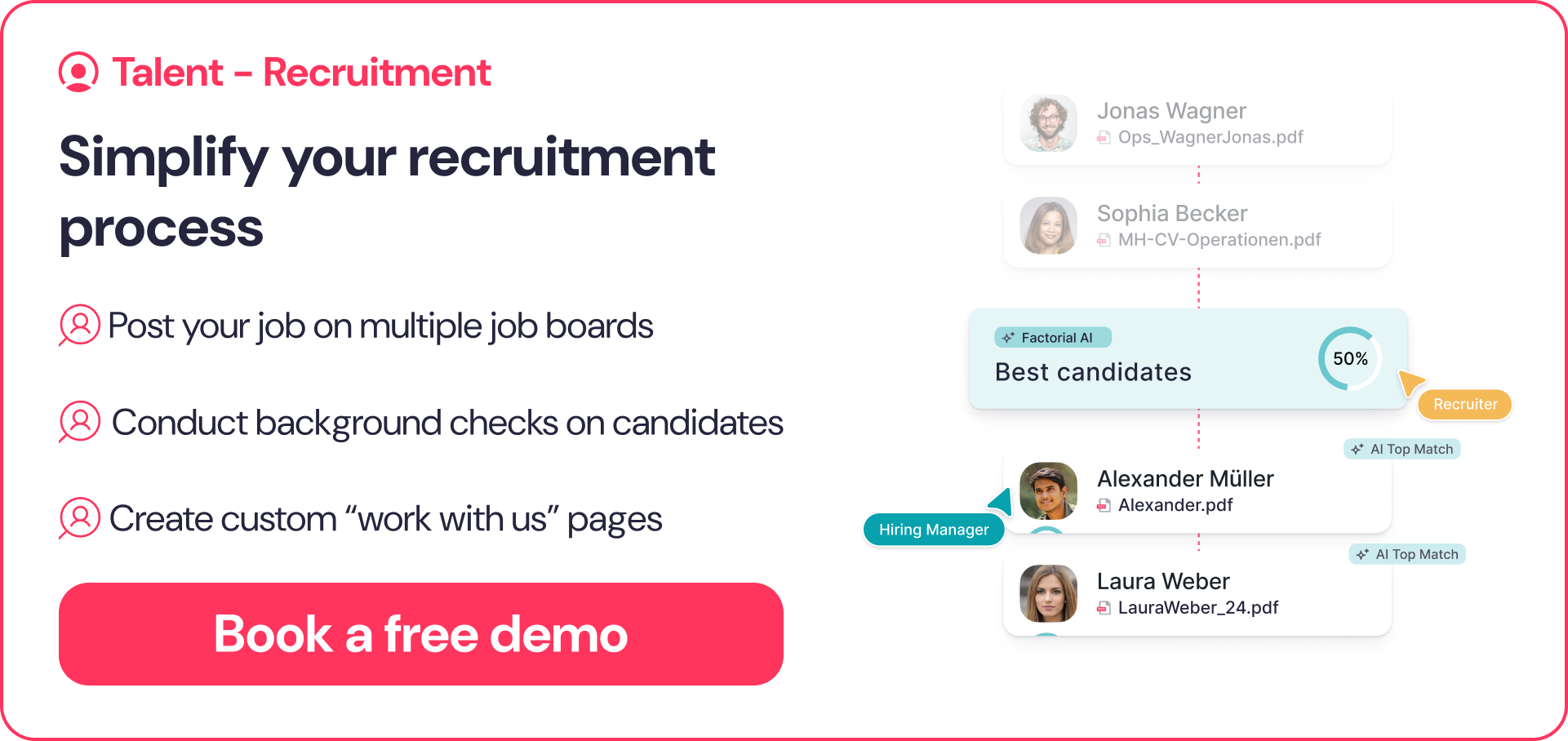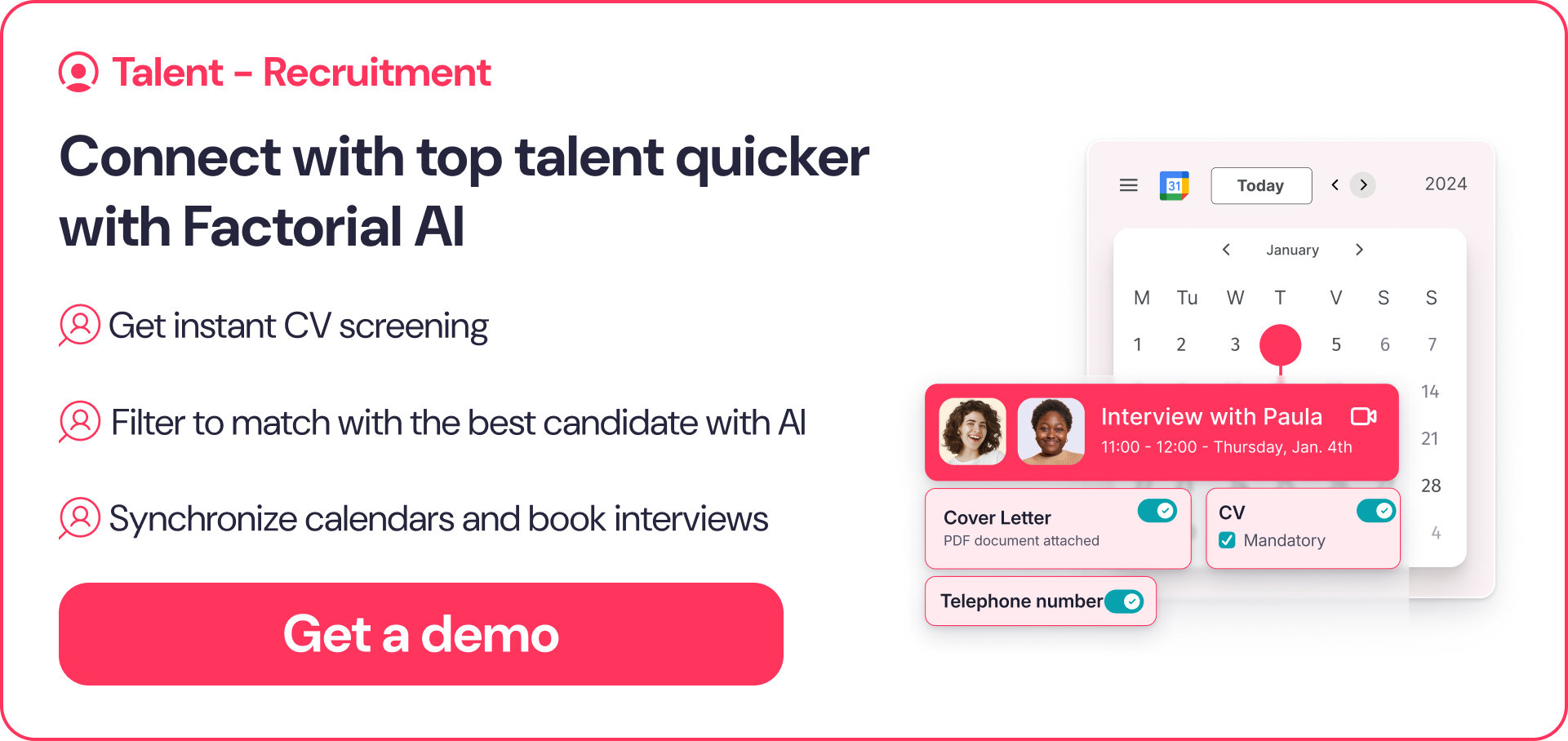Finding the right candidate can feel a lot like winning the lottery. In some cases, the recruitment process doesn’t end there. Employee background checks are a vital part of the pre-employment screening process. They may be required to clear your candidate’s background, character, or integrity. Additionally, they give employers the chance to verify a prospective candidate’s criminal record, credit checks, education and employment history to confirm their validity.
In this article, we’ll cover what a background check consists of, the most common types, and how to conduct background checks on a potential employee. Failing to conduct a complete background screening could result in trouble for your business in ways beyond fines, long-term damage to your company brand. Let’s dive into the background check process!
What are Employee Background Checks?
A background check is a legal investigation into a potential employee’s history. Background screening often involves criminal background checks, identity verification, and education and credential checks. It can also include health checks, DVLA checks, social media screening and drug screening.
The level of investigation you need to undertake will depend on the post being filled. In other words, if you are recruiting someone at an executive level (such as a new CFO) then you will need to perform more checks than for someone at a junior or entry-level.
Employee background checks are usually included as part of the pre-screening recruitment process, although they can be undertaken at any point that an employer feels is necessary. They are used to verify that a person is who they claim to be to ensure the safety of your workforce and uphold your company’s reputation. Depending on the checks conducted, background screening can reveal if a potential new recruit is honest and trustworthy and if they can perform the duties of the position.
Key Elements of a Background Check
UK employment background checks usually consist of the following, most of which are regulated by law:
Criminal record checks: Used to check an individual’s criminal history. A criminal background check is common for a range of positions including teachers and social workers. Checks must be proportionate to the role being applied for. They must also comply with the Rehabilitation of Offenders Act (ROA) 1974. Make sure you conduct the right Disclosure and Barring Service (DBS) check for each employee.
Right to Work checks: Used to ensure an applicant is legally entitled to work in the UK. You must conduct these checks for all applicants. As an employer, it is your responsibility to conduct and maintain a record of all RTW checks. Failure to do so can result in fines of up to £20,000.
DVLA checks: Used for roles where an employee will be driving on company time. This might include sales reps or couriers. A requirement of the Corporate Manslaughter and Corporate Homicide Act 2007.
Health check: Used exclusively for cases where it is a legal requirement. For example, eye tests for commercial vehicle drivers.
Education and employment background check: Standard checks used to verify a candidate’s qualifications and work history. Employment references are included within this.
Social media screening: Used by some employers to gain insight into a candidate’s values and attitude. Can be used to make sure a candidate is the right fit for a position.
Importance of Background Checks
- Trustworthy employees: Background checks provide you with the “bigger picture” of who a candidate really is. They can help you find the right person for the job.
- Fraud Prevention: Certain candidates might lie on their CV or embellish their qualifications. Employee background checks help you spot inconsistencies and avoid hiring someone who is under-qualified or inexperienced. This is an essential part of the recruitment process because hiring the wrong person can have a direct impact on quality and productivity.
- Data Security: As an employer, it is vital that you have measures in place to prevent data theft and loss. This is especially true if a candidate will be handling confidential or sensitive data. HR background checks can help you protect your organisation from hackers, data theft and financial loss.
- Protecting Your Workforce: As an employer, it is your responsibility to make sure your employees are protected from hostile working environments. Employment background checks will help you weed out any candidates who might pose a potential threat. This includes bullying, discrimination, acts of violence or sexual harassment. By protecting your employees you will build a happier workforce and achieve higher retention levels.
- Legal Compliance: As an employer, you must check that your employees are legally entitled to work for you. By conducting Right to Work and industry-specific checks you ensure compliance and avoid any potentially hefty files.
DBS Check (Basic, Standard, Advanced) vs BPSS Check
DBS Checks (Disclosure and Barring Service) in the UK and BPSS Checks (Baseline Personnel Security Standard) are two common pre-employment screening checks that are easily confused. They serve different purposes and are used in distinct contexts:
DBS Checks:
- Basic DBS Check: Provides a basic overview of an individual’s criminal record. It includes unspent convictions and conditional cautions.
- Standard DBS Check: Includes checks for unspent convictions, cautions, reprimands, and final warnings, as well as any additional information held by local police that’s considered relevant.
- Enhanced DBS Check: Provides the same information as a standard check but includes a check of the local police’s records and may also include relevant information held by other government departments and agencies.
- Enhanced DBS check with Barred List: Enhanced check plus a search of the barred list.
These checks are often required for positions that involve working with children or vulnerable adults. Employers in certain sectors, such as healthcare, education, or finance, might request these checks to ensure the safety and suitability of potential employees.
BPSS Check (Baseline Personnel Security Standard):
BPSS is more focused on determining an individual’s baseline suitability to work in government or other sensitive environments. It typically involves four main checks:
- Identity: Verification of an individual’s identity.
- Employment History: Confirmation of an individual’s employment history.
- Nationality and Immigration Status: Confirmation of an individual’s right to work in the UK.
- Criminal Record Declaration: Requires individuals to declare any unspent convictions.
The BPSS check is primarily used within government agencies and departments, as well as in other contexts where there is a need to assess the baseline security suitability of individuals accessing sensitive information or environments.
The key differences lie in their focus and the level of detail in the checks. DBS checks are primarily concerned with criminal records, while the BPSS check concentrates on broader security aspects beyond just criminal history.
Both checks serve specific purposes and are used in different settings based on the level of security clearance or background information required for the job or role in question.
How to Perform a Valid Background Check
The type of employment background check you need will depend on the role you are recruiting. For example, if you work in healthcare or childcare then your candidates may be subject to more detailed checks.
The first step is to find out which DBS check you need. You can find this out by checking out this government site. This will help you establish if you are legally able to run a full criminal record check on a potential employee. If you are not permitted to run this check, you can still ask an employee to run a Basic DBS check on themselves. You can also use the DBS update service to carry out checks on a potential employee’s certificate.
Performing a valid background check is crucial for various contexts, whether in employment, tenancy, or other areas where assessing an individual’s history is essential. To conduct a comprehensive and valid background check, several key steps and considerations should be followed.
Key steps to run a background check:
1. Identify the Purpose and Scope: Clearly define the purpose of the background check and the scope of information required. Determine whether it’s for employment, tenancy, security clearance, or other specific reasons.
2. Obtain Consent: Ensure that the individual being screened provides consent for the background check. It’s a legal requirement in most cases and an ethical practice to obtain permission before delving into someone’s personal history.
3. Use Reliable Sources: Utilise reputable sources to gather information. This can include official records, professional databases, and verified contacts. Common sources include criminal record repositories, credit bureaus, educational institutions, and previous employers.
4. Verify Identity: Confirm the individual’s identity to ensure the accuracy of the information being collected. This might involve cross-referencing various forms of identification.
5. Check Criminal Records: Verify criminal history through appropriate channels, such as national or local criminal databases. The depth of the check (basic, standard, advanced) should align with the context of the background check.
6. Verify Employment and Education History: Cross-check employment history and educational qualifications. Contact previous employers and educational institutions to confirm dates of employment, positions held, and academic credentials.
7. Review Credit History: In some cases, especially for financial positions, checking an individual’s credit history might be necessary to assess their financial responsibility.
8. Maintain Compliance with Regulations: Ensure the background check complies with relevant laws and regulations. Different regions and contexts have specific rules governing the extent and manner of background checks.
9. Respect Confidentiality: Handle the obtained information confidentially and securely, ensuring it’s only accessed by authorised personnel and used solely for the intended purpose.
10. Communicate Findings Clearly: Finally, when the background check is completed, communicate the findings transparently and responsibly, respecting the individual’s right to know the results.
How Much Does a Background Check Cost?
The cost of a UK background check will depend on the check being carried out, and who is requesting it. Not all background checks are free and not all candidates are entitled to a free background check. There are, however, certain background checks that are free, such as social media screening, reference checks, and verifying education and credentials.
Anyone is entitled to request an individual basic DBS check. The fee for this UK background check is £23, and it is paid for by the applicant. If the role you are recruiting for requires you to perform standard and enhanced checks, then you, as the employer, will usually pay for it. The fee for an enhanced check is £45.
Ensure you are legally entitled to carry out this check and have the individual’s written permission to do so. You do not need to pay or register to carry out a status check on a candidate or employee.
How Long Does a Criminal Background Check Take for Employment?
The time it takes to complete an employee background check in the UK will depend on the check being carried out:
- Right-to-work checks, UK credit checks and DVLA checks are usually processed instantly.
- A DBS background check takes longer. Basic checks can take anything from 1 to 14 days. Standard and enhanced checks usually take around 8 weeks. Name changes or frequent changes of address can delay an application. The pandemic has also had an impact on the turnaround.
- Although certificates do not expire, a police background check UK certificate only shows an individual’s convictions on the check date. If you work in a regulated environment like healthcare, residential care, teaching or security, you may need to conduct refresher checks on your employees periodically.
- Employment checks such as references from past employers and verification of skills and credentials usually take a few business days. This does depend on how quickly the other party responds to your request.
Pre-Employment Screening Checks in the UK
Pre-employment screening checks in the UK are similar to the US, although they are regulated by different laws and restrictions.
Criminal record checks
They must be proportionate and relevant to the role being applied for. They must also comply with the Rehabilitation of Offenders Act (ROA) 1974. Spent convictions (where someone who has committed a criminal offence but has not re-offended in a given period) cannot be requested.
Education and credential checks
Used to verify the knowledge and skills included in a candidate’s CV. These include checking university degrees, technical training, and other education and credential verification.
Reference checks
References from previous employers are verified to ensure the right fit for a job. This can be done via phone or letter/email. Discriminatory questions must be avoided at all times.
Right to Work checks
A Right to Work check ensures an applicant is legally allowed to work in the UK. These must be undertaken for all applicants, regardless of race, nationality or ethnic origin, to avoid discrimination claims. Records must be maintained for all checks.
Credit checks
Usually reserved for those working in the financial sector and checks must be proportionate to the role in question (i.e. relevant for a financial director but not for an admin assistant).
DVLA checks
Relevant for employees who drive on company time (such as sales reps or hauliers). Names and dates of birth must be cross-referenced with information supplied on the criminal record consent form. A requirement of the Corporate Manslaughter and Corporate Homicide Act 2007.
Social media screening
Optional. These checks can be carried out to provide valuable insight into a candidate’s values and attitude. It can be used to detect any potentially incriminating activity that could impact the organisation. Care must be taken to avoid any potential claims relating to discrimination.
How Can an Applicant Tracking System Help?
An applicant tracking system (ATS) is an automated platform that manages the recruiting and hiring process, including job postings and job applications. It helps consolidate and automate all processes relating to job candidates. Once a hiring decision is made, a new employee background check can be integrated with a company’s ATS. Background checks on current employees are also easy to integrate. Check out Factorial’s ATS feature to facilitate the hiring process.
Streamlining Recruitment with an Applicant Tracking System
Factorial is a comprehensive, all-in-one HR management software that offers various features and tools to streamline the recruitment process. With Factorial’s Applicant Tracking System, recruitment teams can streamline the hiring process by posting optimised job openings, managing CVs, and tracking candidate progress, collaborating with hiring managers to review candidates and schedule their interviews effortlessly.
You can also easily create and publish job listings on multiple platforms, including your company’s career page and popular job boards. This helps attract a wider pool of candidates and ensures that your job openings reach the right audience.
What’s more, our Document Management System allows you to digitally store all documents linked to each potential candidate so that all paperwork related to background checks (reference checks, credit check etc) can be stored in one place.
Book a free demo to speak to an expert and learn more!




